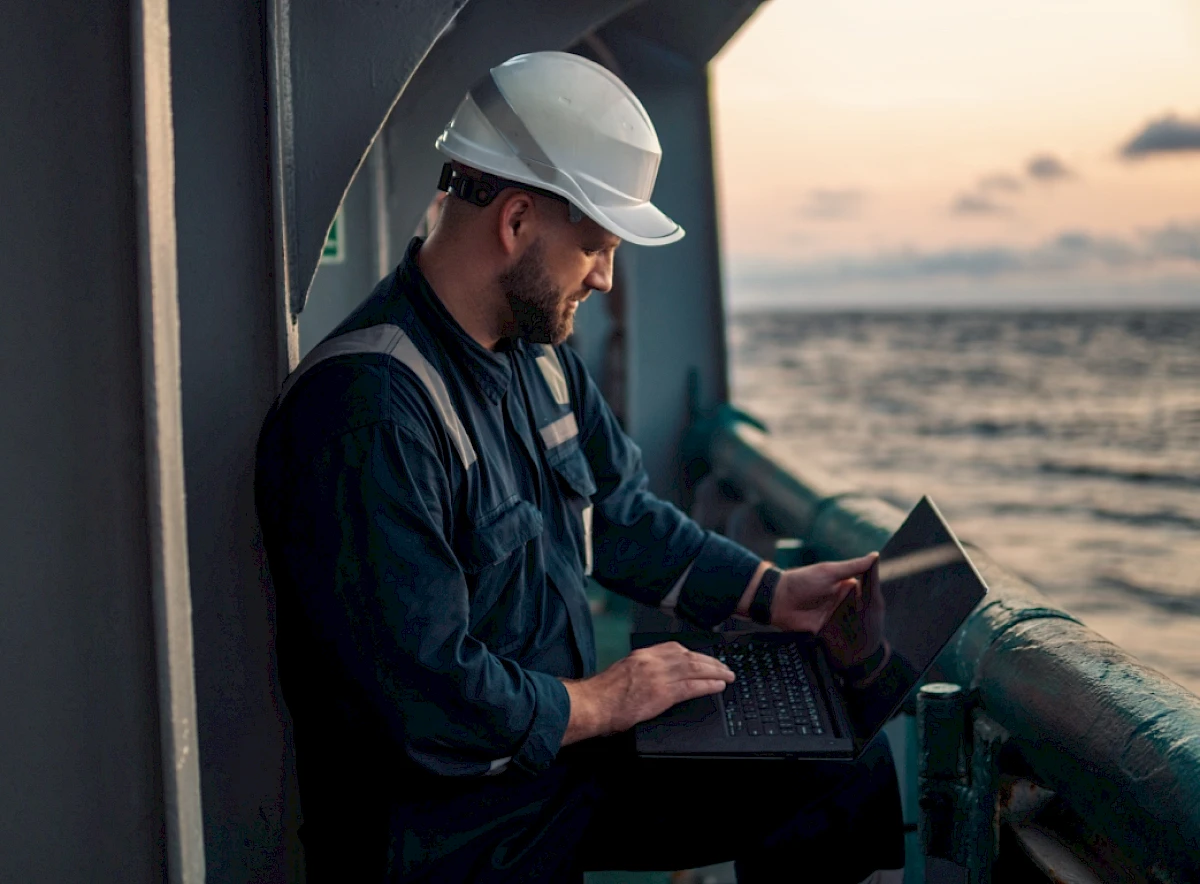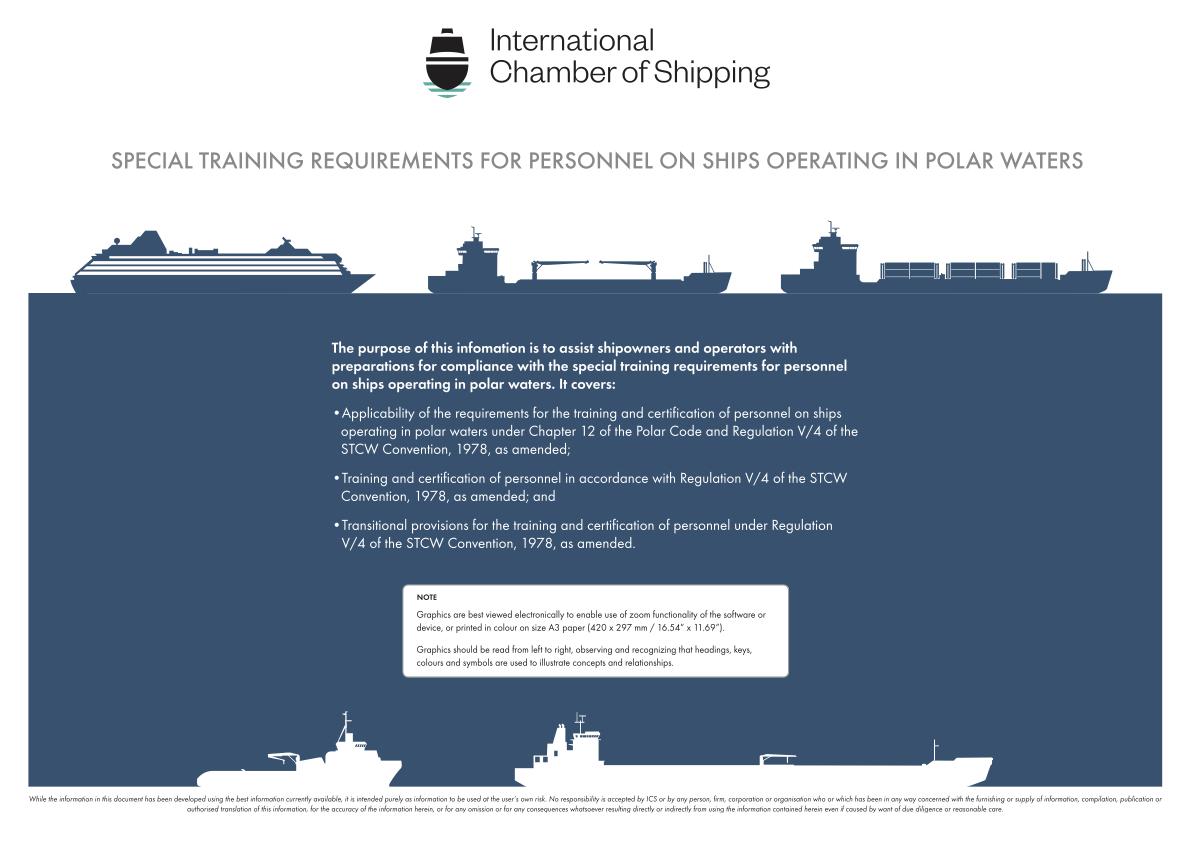Chapter 12: Manning and Training (Part IA)
Chapter summary:
Chapter 12 includes requirements to help ensure that ships operating in polar waters are appropriately manned by adequately qualified, trained and experienced personnel. These are clearly set out in the Chapter 12 wording below.

Submissions
Hyperlink: IMO Polar Code
Follow this link for DNV GL’s guide to the Polar Code Document ‘Maritime Polar Code: Understand the Code’s requirements to take the right steps for smooth compliance’. For Chapter 12, see page 28.
See also:
Hyperlink: http://www.icetra.is
The Icelandic Transport Authority manages the administration of transport affairs and conducts oversight pertaining to aviation, maritime affairs, traffic and safety oversight of transport structures and navigation. The Icelandic Transport Authority issues certificates to seafarares and is responsible for Port State Control and Flag State Control and manages the Icelandic ship registry.
Hyperlink 1: Northern Sea Route – Best practices and Challenges (2017)
For Chapter 12, see pages 5 and 19.
Hyperlink 2: Offshore Vessel Operations In Ice and or Severe Sub Zero Temperatures in Artic and Sub Artic regions (2014).
The purpose of this paper is to provide guidance to operators and charterers of offshore support vessels employed for use in areas impacted by ice or severe sub-zero temperatures with the aim of encouraging high standards of safety and environmental protection for those operating in Arctic and Sub-Arctic regions.
Hyperlink: https://www.nialexisplatform.org/certification/ice-navigation/training-standard/
The Nautical Institute Ice Navigator Training and Accreditation Scheme Standard is relevant to Chapter 12 of the Polar Code - Manning and Training. The Standard is consistent with the requirements for training under the Polar Code and adds to this a specified period of experience in ice for the award of Ice Navigator qualifications awarded by The Nautical Institute. The Standard explains the evidence requirement for those with previous experience and how suitable evidence can be compiled for new entrants. The Standard was developed following widespread consultation with training institutions and operators.
IHO website.
Training of Seafarers
 Resolution MSC.416(97), adopted on 25 November 2016, containing amendments to the STCW Convention, 1978 , including amended regulation I/1.1 adding definitions of “Polar code” and “Polar waters”, amended regulation I/11 requiring continued seagoing service for masters and officers for the continued professional competence for ships operating in polar waters, amendments to chapter V of the STCW Convention (Regulation V/4 on “Mandatory minimum requirements for the training and qualifications of masters and deck officers on ships operating in polar waters”).
Resolution MSC.416(97), adopted on 25 November 2016, containing amendments to the STCW Convention, 1978 , including amended regulation I/1.1 adding definitions of “Polar code” and “Polar waters”, amended regulation I/11 requiring continued seagoing service for masters and officers for the continued professional competence for ships operating in polar waters, amendments to chapter V of the STCW Convention (Regulation V/4 on “Mandatory minimum requirements for the training and qualifications of masters and deck officers on ships operating in polar waters”).
This led to the development of IMO model course on Basic and Advanced Training for ships operating in polar waters (see image).
The Polar Code on the IMO website
IMO and Transport Canada have signed a Memorandum of Understanding to deliver regional capacity-building workshops to provide training for trainers to deliver training programmes for seafarers operating in Polar waters and on the implementation of the Polar Code.
The project harnesses IMO's competence as the United Nations specialized agency responsible for setting global standards for the safety, security and facilitation of international shipping and the prevention of pollution by ships, in collaboration with Canada's financial support and expertise in supporting implementation of the Polar Code.
Hyperlink: https://www.nautinst.org/
This page contains articles which explain the application of the Polar Code with respect to training - Chapter 12 and the obligations and expectations on mariners and their employers. They identify the constructs of the International Standard for Ice Navigators created by the leading professional body for those navigating ships - The Nautical Institute and provide other useful background reading. The articles embody best practice in the consideration of training and qualifications for the area.
The Nautical Institute website
Hyperlink 1: https://community.wmo.int/wmo-regional-training-centres
WMO Education and Training Programme (ETRP) designated various Regional Training Centres (RTC) to provide training and course for marine meteorological forecasting, sea ice analysis and forecasting.
Hyperlink 2: https://library.wmo.int/index.php?lvl=notice_display&id=21738#.X7aJvWj0n4Q
The first International Symposium on “Extreme Maritime Weather: Towards Safety of Life at Sea and a Sustainable Blue Economy” was held in London at the International Maritime Organization (IMO) Headquarters from the 23rd to 25th October 2019. Jointly organized by the World Meteorological Organization (WMO) and the IMO, over 200 participants from over 40 different countries attended, representing both private and public sectors, and including Ministers and Ambassadors.
The Session 8 and 9 were both targeted on the discussion on how to strengthen sea ice services and service delivery in the polar regions. The recommendations from the Symposium are to integrate Sea Ice Information into ECDIS by S-411 standards; to develop and standardize the communications of the sea ice information to the ships; to approve established standards for ice forecasters and analysts, and to improve iceberg models to predict location, drift, and deterioration in the face of the greater challenge by a changing climate and the increased vessel traffic in the polar regions.
CHAPTER 12 – MANNING AND TRAINING: Full Polar Code text
As adopted from IMO - Full Polar Code text
12.1 Goal
The goal of this chapter is to ensure that ships operating in polar waters are appropriately manned by adequately qualified, trained and experienced personnel.
12.2 Functional requirements
In order to achieve the goal set out in paragraph 12.1 above, companies shall ensure that masters, chief mates and officers in charge of a navigational watch on board ships operating in polar waters shall have completed training to attain the abilities that are appropriate to the capacity to be filled and duties and responsibilities to be taken up, taking into account the provisions of the STCW Convention and the STCW Code, as amended.
12.3 Regulations
12.3.1 In order to meet the functional requirement of paragraph 12.2 above while operating in polar waters, masters, chief mates and officers in charge of a navigational watch shall be qualified in accordance with chapter V of the STCW Convention and the STCW Code, as amended, as follows:
| Ice conditions | Tankers | Passanger ships | Other |
| Ice free | Not applicable | Not applicable | Not applicable |
| Other waters | Advanced training for master and chief mate. Basic training for officers in charge of a navigational watch. |
Advanced training for master and chief mate. Basic training for officers in charge of a navigational watch. |
Advanced training for master and chief mate. Basic training for officers in charge of a navigational watch. |
12.3.2 The Administration may allow the use of a person(s) other than the master, chief mate or officers of the navigational watch to satisfy the requirements for training, as required by paragraph 12.3.1, provided that:
- .1 this person(s) shall be qualified and certified in accordance with regulation II/2 of the STCW Convention and section A-II/2 of the STCW Code, and meets the advance training requirements noted in the above table;
- .2 while operating in polar waters the ship has sufficient number of persons meeting the appropriate training requirements for polar waters to cover all watches;
- .3 this person(s) is subject to the Administration's minimum hours of rest requirements at all times;
- .4 when operating in waters other than open waters or bergy waters, the master, chief mate and officers in charge of a navigational watch on passenger ships and tankers shall meet the applicable basic training requirements noted in the above table; and
- .5 when operating in waters with ice concentration of more than 2/10, the master, chief mate and officers in charge of a navigational watch on cargo ships other than tankers shall meet the applicable basic training requirements noted in the above table.
12.3.3 The use of a person other than the officer of the navigational watch to satisfy the requirements for training does not relieve the master or officer of the navigational watch from their duties and obligations for the safety of the ship.
12.3.4 Every crew member shall be made familiar with the procedures and equipment contained or referenced in the PWOM relevant to their assigned duties.
 Arctic Council Working Group
Arctic Council Working Group 